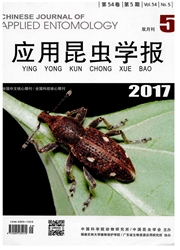

 中文摘要:
中文摘要:
【目的】测定黄粉虫Tenebrio molitor Linnaeus幼虫抗菌肽提取液的浓度、抑菌活性及其部分生化特性和凝血效应。【方法】本实验用浓度为1×108 CFU/m L大肠杆菌Escherichia coli诱导5龄黄粉虫幼虫,分别在诱导12、24、36、48、60和72 h后提取其中的抗菌肽,并用考马斯亮兰法测定抗菌肽粗提液蛋白的浓度,并用滤纸片法测定其抑菌活性,同时对其热稳定性、反复冻融稳定性、蛋白酶稳定性及不同p H对其活性的影响等生化特性及凝血效应进行了探究。【结果】经大肠杆菌诱导的黄粉虫抗菌肽粗提液的蛋白浓度均显著高于未诱导的黄粉虫组(P〈0.01),且在诱导48 h时产生的抗菌肽提取液蛋白的浓度最高,产生的抑菌圈直径也显著高于未诱导的黄粉虫组(P〈0.05),生化特性的测定结果显示,黄粉虫抗菌肽有较好的热稳定性、酶稳定性及酸碱稳定性,反复冻溶后对其抑菌活性影响不大,并且无凝血效应。【结论】大肠杆菌可以刺激黄粉虫的免疫系统,增加抗菌肽的表达量,使其产生浓度高、活性强的抗菌肽,且生化特性较稳定。本研究对黄粉虫抗菌肽作为绿色抗生素用于畜牧养殖业的进一步开发与利用提供了科学的理论依据。
 英文摘要:
英文摘要:
[Objectives] To determine the concentration and antibacterial activity of an antimicrobial peptide(AMPs) extracted from Tenebrio molitor Linnaeus larvae, and to explore its biological properties. [Methods] AMP production was induced in five-day old Tenebrio molitor larvae by Escherichia coli at a concentration of 1×108 CFU/m L. AMPs were extracted from the larvae at 12, 24, 36, 48, 60, and 72 h respectively, their concentration detected by coomassie brilliant blue stain and their antibacterial activity measured using the filter paper method. In addition, other features, such as thermal stability, stability after repeated freezing and thawing, proteinase stability, effect of different p H and coagulation, were also measured. [Results] The results show that inducing the production of AMPs with E. coli resulted in a significantly higher concentration of AMPs being extracted from T.molitor(P 0.01). AMP levels were highest at 48 h. Moreover, the diameter of bacterial inhibition caused by AMPs induced by E. coli was significantly larger(P 0.05). AMPs extracted from T. molitor were stable with respect to variation in temperature, proteinase and p H. Repeated freezing and thawing had little effect on the biological properties of AMPs, including coagulation. Therefore, the immune system of T. molitor produces a higher concentration of AMPs with better biological stability and antibacterial activity, and no coagulation, following induction by E. coli. [Conclusion] These results have laid a theoretical basis for further utilization of antibacterial peptides extracted from T. molitor.
 同期刊论文项目
同期刊论文项目
 同项目期刊论文
同项目期刊论文
 期刊信息
期刊信息
